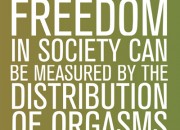Photographers who are sensitive to the privacy of their subjects use a number of techniques to capture a moment without revealing the identity of people involved. One of these techniques is the cropping of the face — most often before or after the nose, in order to convey some emotion through the mouth, but occasionally the face is cropped in its entirety. This isn’t necessarily dehumanizing, but the context is extremely important.
Papers/Rags
The May issue of Good Housekeeping has shocked the internet with an article about vibrators. But this isn’t the first time vibrators have appeared in a magazine targeting the homemaker. In the late 19th century, after technology advanced enough to enable vibrators to be marketed directly to consumers, they started popping up in ads alongside sewing machines in many magazines, including Women’s Home Companion, National Home Journal and Hearst’s.
When the trade magazine Adult Video News, better known as AVN, was founded in 1983, there was very little in the way of attention from the mainstream media when it came to issues facing the adult industry. That’s no longer the case — we now live in a world where sex is often reported in high-profile, mainstream places. What does that mean for AVN and properties like it?
It was a warm spring day in Georgia when Larry Flynt and his attorney were shot on the courthouse steps. Flynt suffered permanent damage that would leave him confined to a wheelchair for the rest of his life. Just the same, he doesn’t believe the man who confessed to the double shooting — a serial killer convicted of eight killings and implicated in 13 others — should die by lethal injection this November. “As I see it, the sole motivating factor behind the death penalty is vengeance, not justice,” the publisher writes.
Over the summer, the Pentagon put those American tax dollars to work and took a long hard look and determined that girlie magazines were not, as a whole, explicit material and could still be sold on military bases. Unfortunately for the magazines, they were removed anyway due to an 86 decline in sales. This is a roundup of what’s going on at the parent companies of some of these American adult classics: Playboy, Penthouse and Hustler. It smells like the end of an era.
Many women are working to take their bodies back by bringing representations of the female body to the public. In Africa, an artist has turned a former jail into a walk-in vagina. In the United States, another artist is using the rodeo to educate the public about the clitoris. In Australia, a student newspaper put 18 vulvae on its cover. The only thing more interesting than the art are the reactions the pieces have inspired.
This summer, the indecency-fighting American organization Morality in Media wrote a very stern letter to the Secretary of Defense telling him to get nudie rags off the shelves at military exchanges. The Pentagon refused to play along. In the response, Assistant Secretary F.E. Vollrath illustrates the hard work the Department of Defense put in investigating the claims that Playboy, Penthouse and Nude are “sexually explicit.”
A source at the Weekly tells us, “the Village Voice profits incredibly from sex, but they don’t know how to feel about it. It’s so much easier to just cut ties with it. The question now is how they mean to survive without it.” Will this be true of the “new” Voice Media Group? It’s a valid question. Divorcing the papers from Backpage.com will enable advertisers to continue doing business with the weeklies without having to fear consumer boycotts for their indirect support of a site accused of enabling the “sale of humans.â€Â
Playboy and other publications of its time, played an important role in creating the legal structure that currently upholds our right to sexual self-expression. It wasn’t always like this. Once, Walt Whitman’s Leaves of Grass was considered obscene. Once, any article dealing with sexual matters — however educational — could result in a $5,000 and up to a decade in prison. The suppression of sexual discourse has always come hand in hand with the suppression of literature, as well as that of scientific inquiry.
Whatever I may think about Cosmopolitan now — and even some of the ideas in this book — it’s impossible to deny that Helen Gurley Brown took a machete to the notion that women needed marriage to be fulfilled. I respect that immensely. Get a job, get your own place, screw the idea that you need anyone, make time for your self, take care of your body, have the epic sex you deserve. Yes. We had our differences, but in that, she and I were on the same page.
















